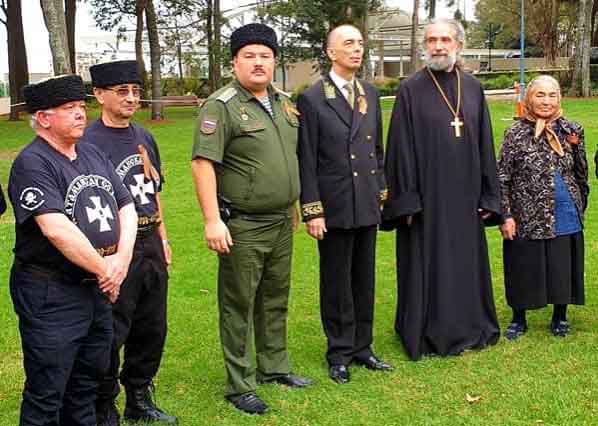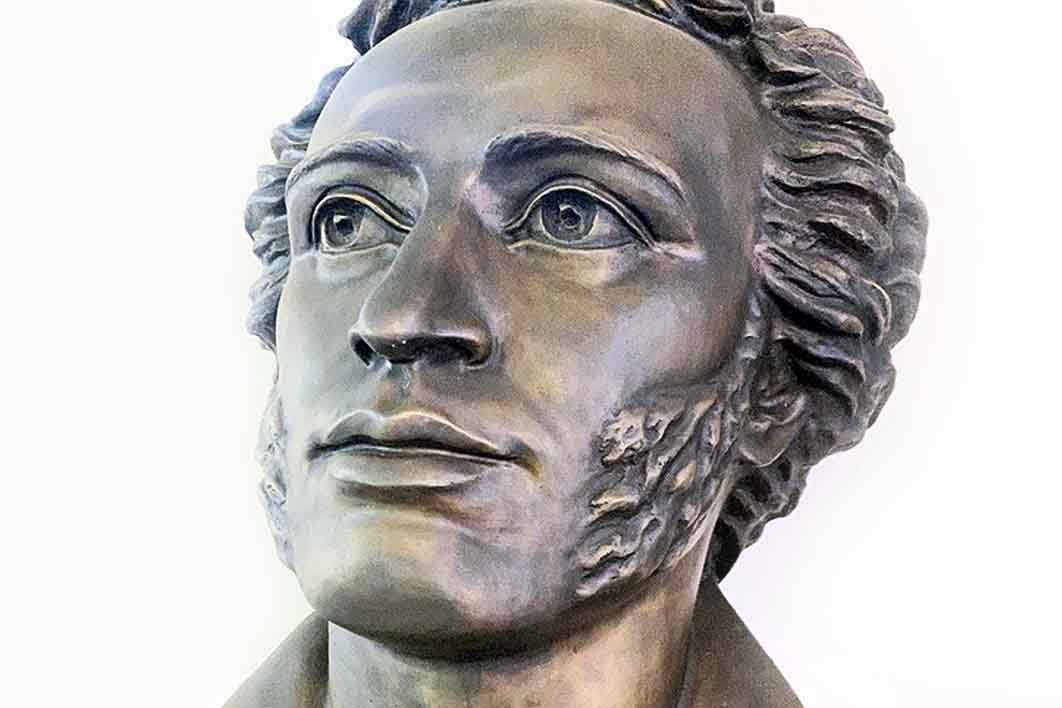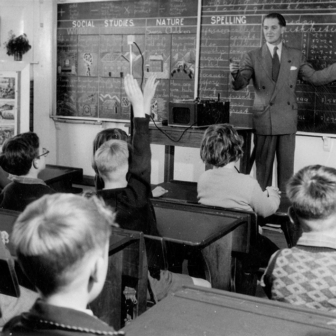I vividly remember the day in May 2018 when the acting dean of the Australian National University’s College of Arts and Social Sciences contacted me in my capacity as a visiting Russia specialist at the Centre for European Studies. The Russian embassy had written to ANU proposing to present it with a bronze bust of the poet Alexander Pushkin “donated by a philanthropist.” ANU had decided to accept the gift, she told me, and had scheduled a ceremony in June.
Perhaps emboldened by the university’s assent, the embassy responded with a further request. On behalf of the Russian government, it also wished to confer on the university’s chancellor, Australia’s former foreign affairs minister Gareth Evans, “a medal for promoting international cooperation.”
This new offer struck us both as an ingenious ploy to have the university’s most senior figure preside over the unveiling of the bust. The embassy could then inform the foreign affairs ministry in Moscow, and presumably the anonymous philanthropist, that it had pulled off a public relations coup.
The offer of the bust was unremarkable. One of the jobs of an embassy is to build networks of contacts that might prove useful in acquiring and exercising influence in its host country; and one of the assets Russian embassies can draw on is Russian literature — which, as Ernest Hemingway remarked in A Moveable Feast, changes you as you read it.
But the context was important. Relations between Australia and Russia had been tense since Vladimir Putin annexed Crimea in 2014. Since then the Russian president had been directing an “insurgency” by alleged separatists in eastern Ukraine, and Australia had responded with economic sanctions.
Australia strengthened the sanctions after the destruction of flight MH17 in July 2014, which it had concluded was Russia’s doing. Prime minister Tony Abbott had consequently expressed an intention to “shirtfront” Putin when he came to Australia for the looming G20 meeting in Brisbane. (Abbott’s verb captured media attention globally and baffled interpreters in both Russia and Australia.)
With its scope for building networks of influence in government and the public service much reduced by Russia’s actions, the embassy naturally focused its efforts on the media, the arts and academia. It seems a fair assumption that Russian embassies in other countries were also seeking to cultivate academic contacts and generate positive publicity for Russia by proffering busts of Pushkin and/or other Russian luminaries to universities, libraries and the like.
The acting dean asked me to draft some remarks for ANU’s chancellor to deliver at the handover ceremony. I had worked for Gareth Evans twice when he was foreign affairs minister: in 1991, as his interpreter on a visit to the Soviet Union in its last months; and later, in 1992–93, in a junior policy-advice role when he and the Keating government responded to the Soviet Union’s dissolution by Yeltsin and the leaders of Belarus and Ukraine.
This meant I was familiar with Evans’s exacting approach to public speaking, and his views on Russia in general, views influenced by his own circle of well-informed friends in Russia. (In this regard, with the possible exception of Kevin Rudd, Evans is probably unique among Australian politicians.) I drafted the remarks accordingly.
In the event, Evans left my work pretty much intact. But he polished it a little and gave it his own stamp — with, for instance, the following ironic flourish: “I am personally very honoured to receive this commemorative medal for contributions to consolidating international cultural cooperation, though a little embarrassed, because I’m not quite clear what I might have done to deserve it.”
He also strengthened a key paragraph regarding the destruction of flight MH17:
In Australia, the shooting down of MH17 just over four years ago continues to particularly burn in our collective memory. While it seems very likely that the militia member who pressed the button to fire the missile that caused so many Australian and other lives to be tragically lost did not intend to destroy a civilian airliner, unless and until that mistake is frankly acknowledged and redressed it is hard to see how any Australian government can invest our bilateral relationship with more substance.
He later told me that he’d found the ceremony “a very tricky occasion to navigate.”
My only cavil with Evans’s refining of my handiwork was his insertion of the words “the Russian soul” at one point in the speech. I could understand why a consummate diplomat chose to do so, but (as Vladimir Nabokov is said to have quipped) “as if a soul has nationality.” In my view, the expression supports the notion that Russians are somehow emotionally more profound than other peoples.
Exactly that claim was made a year after the ANU ceremony by one Valery Malinovsky, who, his Polish name notwithstanding, was a prominent figure in the pro-Putin claque in Australia. Russians, he said, “have deeper emotions; are more hardworking; stand for traditional values — we believe that a woman’s role is to preserve hearth and home, whereas Australian women are feminists who do not put the family first; and we are more patriotic.”
In the same vein, here is Putin in 2014:
So, what are our particular traits? It seems to me that the Russian person thinks mainly about the highest moral truths. Western values are different, focused on oneself. Personal success is the measure of success in life: the more successful a man is, the better he is. This is not enough for us… we are less pragmatic, less calculating than other peoples, we have bigger hearts. Perhaps this reflects the grandeur of our country, its boundless expanses. Our people have a more generous spirit.
I wasn’t at the ANU ceremony, but was given accounts by some who were. The bust itself, as I later saw, is a hefty bronze affair in the Roman and Russian martial tradition. It looks oddly extravagant in the cramped precinct that contains what remains of the university’s once proud tradition of the study of European languages.
In his own remarks for the occasion, Russian ambassador Grigory Logvinov claimed that “international specialists in literature had established that Pushkin is the most universal and greatest poet of all time in any language.”
This assertion recalls a memorable passage in the unpublished memoirs of Andrzej Walicki, an authority on the history of Russian thought, a friend of Isaiah Berlin and Nobel Prize–winning poet Czesław Miłosz, and for some years a professor at ANU. Walicki relates how, as a student at the University of Warsaw in 1951, he attended a series of lectures given by a visiting Soviet professor, one Fyodor Zhurko, who had set himself the task of demonstrating the impregnability of four postulates: that Pushkin was the world’s greatest poet; Tolstoy the world’s greatest novelist; Alexander Ostrovsky the world’s greatest playwright; and Vissarion Belinsky the world’s greatest literary critic.
At his first lecture Zhurko encountered unexpected resistance: most of the students knew that to engage in debate on this level was pointless, but one Tadzio, from a rural village, asked how it could be that Pushkin “ranked above such poets as Byron.” Somewhat flustered, Zhurko responded that he did not know foreign languages and had not read Byron, but Pushkin’s pre-eminence had been “proven by Soviet science.”
This response prompted Tadzio to retort that he “also does not know foreign languages” (Walicki writes that “the comic effect was unintentional”) but he did know Pushkin’s work, and in his view “Mickiewicz was no less of a poet.” Zhurko retorted that Polish literature undoubtedly was great, indeed possibly the third greatest after Russian and Ukrainian, but that Pushkin’s standing as the greatest poet of all time in any language was for Soviet science “axiomatic.”
Following this exchange, as Walicki relates, Zhurko said to his Polish hosts that he had no wish to proceed with the following lectures in the series, as “у вас национализм очень сильно развитый” (“nationalism is very deeply entrenched here”).
An inscription beneath the bust given to ANU records that it was donated not by a philanthropist but by the “International Charity Fund ‘Dialogue of Cultures — United World.’” A little research reveals that the partners of the “charity fund” include Russia’s foreign affairs and culture ministries. These ties suggest that, while purporting to be some manner of non-government organisation, the outfit is in fact an agency of the Russian state. The following excerpts, with their idiosyncratic English, are from a mission statement on the organisation’s website.
Since its establishment in 2005, «Dialogue of Cultures — United World» Fund has implemented more than 450 projects in different countries. The Fund works closely with international organizations, state authorities of the Russian Federation and Russian non-governmental organizations, educational institutions in the field of international cooperation, culture and education.
Each culture — a combination of unique traditions, customs and holidays, this age-old wisdom, passed on from generation to generation, this galaxy of outstanding writers, artists, musicians and scientists, this particular philosophy, vision and thinking — it’s what makes the beauty of the world around them depth and complexity, then, of which each of us draws inspiration daily. To preserve and develop national culture — the noble task of mankind.
Fund «Dialogue of Cultures — United World» retains and promotes the historical uniqueness of ethnic groups living in the modern world and to create a tool for cultural rapprochement of peoples, through the creation of worldwide sites for a living dialogue of cultures.
More exploration of the website reveals that in 2007 in Brisbane the fund established a monument to one K.E. Tsiolkovskiy, described by the site as “a Russian provincial teacher and scholar, founder of Soviet cosmonautics, who paved the way into space for all the mankind… The scientist was born in Russia, but his discoveries belong to the entire world.”
The website also reports that donated busts of Pushkin have been placed in Ulaanbaatar, Dhaka and Montevideo; and that the Mongolian bust was handed over in 2015 by the then minister counsellor of the Russian embassy, Igor Arzhaev. Arzhaev is currently Russia’s consul general in Sydney, and Russian-language publications in Australia suggest he devotes much time to liaising with those diaspora members in Sydney who support the current Russian leadership’s policies. Prominent among these is the self-styled “Aussie Cossack,” Simeon Boikov, with whom Arzhaev is pictured below in Russian diplomatic uniform.
More important, the fund’s website reveals ties between the fund and prominent members of Putin’s close entourage, including Sergei Naryshkin, a member of the National Security Council and head of SVR, Russia’s foreign espionage service, and Sergei Glaz’ev, “Advisor to the President for Eurasian Cooperation.” Glaz’ev, who is among the most energetic proponents of the forcible reabsorption of Ukraine into the Russian empire, also has ties to the Australian Citizens Party via the LaRouche movement, a longstanding far-right American activist group.

Middle man: Igor Arzhaev (third from right), Russia’s consul general in Sydney, with “Aussie Cossack” Simeon Boikov (in green). Facebook
The tale of the ANU bust contains a dual irony. If any Australian politicians deserve formal recognition for their promotion of international cooperation, surely none is more worthy than Gareth Evans, for none has done more in support of the ideal of a “rules-based order.” Conversely, no one, not even Donald Trump, has been more conspicuous than Vladimir Putin in their efforts to undermine such a mechanism to manage the inevitable conflicts between nation-states and great powers.
But there’s a third irony, more piquant and profound. It’s hard to think of a state that has killed or been complicit in the deaths of more of its poets than Russia. An incomplete but well-verified list compiled by literary scholar Vera Sokolinskaya contains the names of hundreds of Russian writers, journalists and artists executed, imprisoned or forced into exile by Russia’s rulers.
For various reasons, Pushkin is on the list. From the age of twenty he was internally exiled several times for his verses; in 1826 Tsar Nikolai I appointed himself Pushkin’s censor (though in practice the role was carried out by the chief of the tsar’s secret police); and in 1829 his request to travel abroad was denied.
But two other decisions by Tsar Nikolai combined to prove fatal for Pushkin. In 1831 the poet married Natalya Goncharova, a legendary beauty and thereafter an adornment at court. Two years later Nikolai appointed Pushkin to the humiliatingly lowly position of kamer-junker (gentleman of the chamber), which effectively entailed only one duty: his, and Natalya’s, regular appearances at court balls.
Probably sensing danger from would-be seducers among his wife’s jostling admirers, burdened heavily by debts and unable to afford life in St Petersburg, Pushkin sought royal permission to retire to his modest country estate — and was denied. In 1835 a young French officer of the Russian Horse Guards began provocatively wooing Natalya; by January 1837, according to the mores of the time and place, Pushkin felt compelled to provoke a duel. He was wounded fatally and died in extreme pain thirty-six hours later.
Had it not been for the tsar’s whims, Pushkin would probably have lived well beyond his thirty-seven years. (Pushkin’s final years and fate are an epic tragedy: see, among various accounts, Elaine Feinstein’s judicious biography.) Today, though, this victim of Russian autocracy is presented as a demigod whose writings prove the innate superiority of what Putin and his supporters claim is “Russian civilisation.” •




